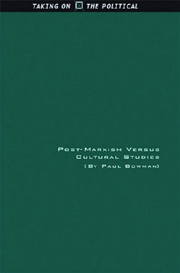Four - Post-Marxist Cultural Studies' Theory, Politics and Intervention
Published online by Cambridge University Press: 12 September 2012
Summary
Philosophers have hitherto only interpreted the world in various ways; the point is to change it.
(Karl Marx 1845)What remains still to be conquered is the repetition compulsion.
(Jacques Derrida 1998a: 22)Relations and Effects
Stuart Hall deems ‘the discursive metaphor’ with which this book has been concerned, and which is central to post-Marxist discourse theory and cultural studies, to be so ‘extraordinarily rich’ as to entail ‘massive political consequences’. Indeed, he ventures, ‘if I had to put my finger on the one thing which constitutes the theoretical revolution of our time, I think that it lies in that metaphor’ (Hall 1996d: 145). At a stroke, then, post-Marxism and cultural studies are articulated (at least theoretically, or metaphorically), given that this paradigmatic ‘metaphor’ is so central to them both. However, Hall's enthusiastic evocation of ‘the theoretical revolution of our time’ and the ‘massive political consequences’ of this metaphor begs several questions. It seems to involve a mismatch of concepts, or a dissymmetry. For, how can a metaphor have massive political consequences? What is revolutionary about a theoretical revolution? And, to add the question begged by my own articulation of post-Marxism and cultural studies, what is the precise nature of their articulation?
These questions ought to be approached sequentially. This is because what underpins Hall's reasoning is the by now familiar rationale (reiterated and examined in various ways throughout this book) that ‘metaphors are serious things’, because ‘they affect one's practice’ (Hall 1996: 268).
- Type
- Chapter
- Information
- Post-Marxism Versus Cultural StudiesTheory Politics and Intervention, pp. 168 - 212Publisher: Edinburgh University PressPrint publication year: 2007



